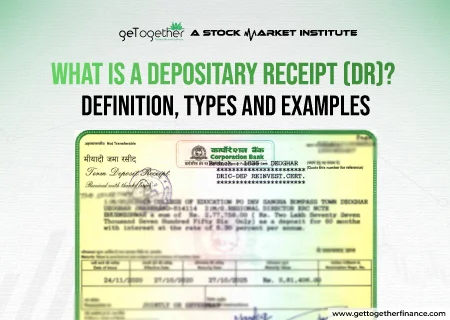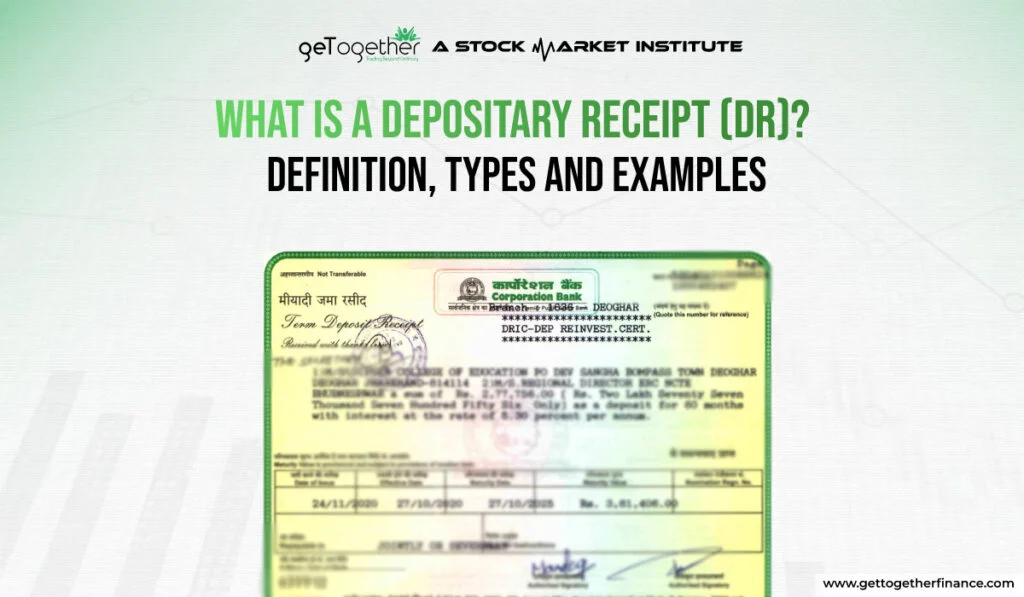What is a Depositary Receipt (DR)? Definition, Types, and Examples


Investing in foreign markets can be complex and risky. Currency fluctuations, different regulatory environments, and the hassle of dealing with international brokers can often deter investors. But in this fuss, what investors seek is a way to invest in foreign companies without these challenges.
This is where the era of depositary receipts (DRs) came into the picture. These financial instruments acted as a bridge between domestic and international markets, making global investing more accessible. With this blog, we’ll reveal the secrets behind DRs, exploring their types, how they work, and why they’ve become a popular choice for investors looking to diversify their portfolios.
Table of Contents
ToggleWhat Is a Depositary Receipt (DR)?
A depositary receipt (DR) is a special kind of financial instrument that allows investors to own shares in a company based in another country. It’s like a ticket that represents a share in a foreign company and can be traded on a local stock exchange in your own country.
In simpler terms, a depositary receipt lets investors buy shares of foreign companies without directly dealing with foreign stock markets. Instead, they can trade through a major bank or financial institution in the country, which makes it easier and cheaper. A DP simplifies investing in foreign companies as investors don’t have to deal with foreign currencies or open accounts abroad like they used to. Depositary receipts were made to make investing in foreign stocks simpler and more accessible for everyone.
How are Depositary Receipts (DR) Issued?

Depositary receipts (DRs) are issued by banks to represent shares in foreign companies and are traded on local stock exchanges. Here is how depositary receipts are issued:
- Initial Steps: A foreign company should meet the specific rules of the stock exchange where it wishes to list its shares. For example, a company must transfer shares to a brokerage house in its home country.
- Bank Involvement: A bank, typically a foreign bank, studies the financials of the foreign company to assess the strength of its stock. The bank then buys shares of the foreign company.
- Grouping Shares: The shares are grouped into packets, which are then issued as depositary receipts.
- Listing on Exchange: The depositary receipts are listed on a local stock exchange, such as the National Stock Exchange of India (NSE) or the Bombay Stock Exchange (BSE).
- Trading and Settlement: Investors can trade (buy or sell) DRs through their regular brokerage accounts such as Dhan during regular market hours just like buying shares. When investors buy or sell a DR, the trade is executed on the stock exchange.
- When an investor buys a DR on the Indian exchange, the custodian bank debits the corresponding shares from its foreign holdings and credits them to the investor’s account within the custodian‘s foreign account. DR trades take a T+2 cycle (two business days after the trade) to settle.
In India, depositary receipts are commonly used to facilitate the trading of shares in foreign companies. For example, a company listed on the London Stock Exchange might issue depositary receipts that are traded on the NSE or BSE, making it easier for investors to invest in the company without having to deal with the complexities of trading in the UK market.
This process allows investors to own shares in foreign companies while trading on their local stock exchanges, reducing the need for direct trading in foreign markets and the associated costs and complexities.
Types of Depositary Receipts

There are two main types of depositary receipts:
American Depositary Receipts (ADRs):
ADRs are issued by U.S. depositary banks and traded on U.S. stock exchanges. They represent shares of foreign companies and allow U.S. investors to trade in foreign stocks without dealing directly with foreign markets. Under ADR, dividends are paid in U.S. dollars, and ADRs follow U.S. reporting and disclosure requirements.
Global Depositary Receipts (GDRs):
GDRs are issued by international depositary banks outside the U.S. and traded on international stock exchanges. It complies with the regulations of the markets where they are traded. They represent shares of foreign companies and allow global investors to invest in foreign stocks, generally denominated in major currencies like the U.S. dollar or euro.
European Depositary Receipts (EDRs):
EDRs are similar to ADRs and GDRs but specifically issued and traded in European markets. They represent shares of non-European companies and provide European investors with access to international stocks. EDRs may be denominated in euros or other local currencies, based on the market’s preference.
Also Read: Working Capital

Advantages of Depositary Receipts (DRs):
Besides bringing the convenience in the trading and foreign exchange, a DR has several benefits, such as:
- Global Access: DRs let you invest in foreign companies easily without dealing directly with foreign markets. This expands your investment choices.
- Currency Convenience: DRs are usually traded in major currencies, so you don’t have to worry about currency exchange rates as much.
- Easy Trading: They’re traded on big stock exchanges, so it’s easier to buy and sell them compared to foreign stocks.
- Regulation Protection: DRs follow local market rules, so you get transparency and legal protections.
- Dividend Payment: You receive dividends in your local currency, making it simpler to manage your earnings.
Disadvantages of Depositary Receipts (DRs)
Now let’s discuss a few disadvantages of depositary receipts that come with the convenience they bring to the table:
- Costs: There are fees for owning DRs, like issuance and custody fees, which can eat into your profits.
- Currency Risk: Even though DRs reduce some currency risks, changes in exchange rates can still affect your investment.
- Limited Voting Rights: Depending on the type of DR, you might not have a say in how the company is run.
- Market Uncertainty: DR prices might not always match the actual stock prices due to market conditions.
- Complex Rules: Investing in DRs means dealing with different countries’ rules and regulations, which can be tricky and expensive to navigate.
Conclusion
In a nutshell, depositary receipts (DRs) provide investors with a straightforward way to invest in foreign companies without the complexities of dealing directly with foreign markets. They come in different types with each of its own advantages and setbacks. While DRs broaden investment opportunities, prudent investors should conduct thorough due diligence and consider their individual risk tolerance and investment objectives before incorporating DRs into their portfolios.
FAQs
How do DRs work?
A depository bank holds the foreign company’s shares and issues DRs to represent ownership. These DRs are then traded on the local stock exchange.
Can I invest in DRs with a small amount of money?
Yes, you can invest in DRs through mutual funds with lower investment amounts.
Is it better to invest in DRs or directly in foreign stocks?
It depends on your investment goals, risk tolerance, and the complexity of investing in foreign markets.
Are there any fees associated with DRs?
Yes, there may be brokerage fees, custodian fees, and other charges.



 Facebook
Facebook Instagram
Instagram Youtube
Youtube
